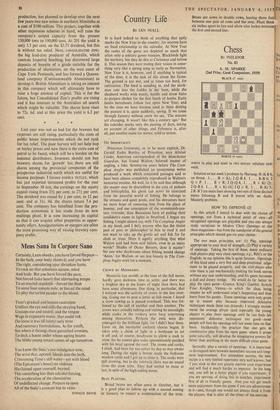Chess
A. M. SPARKE (2nd Prize, Good Companions, 1919)
BLACK (7 men)
WHITE (9 men)
WHITE to play and mate in two moves: solution next week.
Solution to last week's problem by Hartong: R-K B 6, no threat. .1 . . . B x Kt; 2 Q-B 4. I • . . B-B 6; 2 Q x P. 1 . . B x R ; 2 Q-Q 4. I . . . R x Kt (2); 2 Q-B 6. I R x Kt (4); 2 Q x R. I R-Kt 3; 2 R-B 5 are main lin8 showing two sets of three distinct mates following R and B moves with no duals. Masterly problem.
HOW TO IMPROVE (2)
In this article I intend to deal with the choice of openings, not from a technical point of view—all recognised openings are playable and you can always study variations in Modern 'Chess Openings or the chess magazines—but from the standpoint of the general principles which should govern your choice.
The two main principles are: (I) Play openings appropriate to your level of strength; (2) Play a variety of openings. Taking the first of these, many ordinary club players play very close openings, e.g., 12.6ti's or the English; in my opinion this is quite fatuous. Openings of this kind need a very fine and deep positional udge- ment to be played properly, and the club player who tries them is just mechanically making the book moves without any real understanding, and his game becomes a dull and dreary stodge. He would do far better to play the open game—Oiuoco, King's Gambit, Scotch Four Knights, Vienna—in which the ideas being simpler he will understand what's happening and thus learn from his games. These openings were only given up in master play because improved defensive techniques made them too drawish; I strongly recom- mend the average player (and especially the young player) to play these openings until he too finds his opponents' defensive techniques too good—most people will find the openings will last some time on that • basis. Incidentally, the practice that one gets in combinative play from the open game where it arises ' quite naturally, will develop the imaginative powers far better than anything in the more difficult close game.
Secondly, play a variety of openings. It is important io distinguish here between immediate success and long- term improvement. For immediate success, the best recipe is a very limited repertoire very well known; but ,f you stick to this you greatly narrow your experience and will find it much harder to improve. In the long run, you will be a better player if you experiment; if you are nervous of doing this in matched, experiment first of all in friendly games. Also you will get much more enjoyment from the game if you are adventurous in it—and, though one would not always think it from the players. that is after all the object of the exercise.














































 Previous page
Previous page